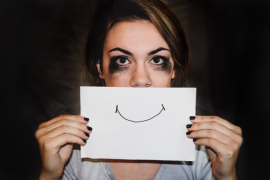Sweating is one of the involuntary actions which occur in the body from time to time. The uneasy feeling that comes with it is often one which will rather be avoided and so people purchase all sorts of deodorants, body sprays and antiperspirants. Yes, that wasn’t a mistake. The deodorant is actually different from the antiperspirant.

In this week’s 7 things series, we present the responses of Dr. Pixie McKenna, star of Channel 4’s Embarrassing Bodies and expert on behalf of Perspirex antiperspirant; and renowned hyperhidrosis (a condition which causes excessive sweating) specialist, Professor Mark Whiteley of The Whiteley Clinic; to Catriona Harvey-Jenner’s enquiries, on some things we may not have known about sweat. Here are the responses:
- It’s actually odourless
When sweat is secreted by the sweat glands all around our body, it actually emerges odourless. So how do people end up with body odour, we’re sure you’re wondering? Dr. Pixie informs us that BO is ‘only caused when the bacteria on the surface of the skin breaks down the components of perspiration.’
- It really does have a useful function
Although sweating is usually seen as something that ruins our chic look with the arrival of two great big sweat patches under each arm, it also exists as a means of regulating our body temperature and helping cool us down, according to Dr. Pixie. Not that it feels like it’s cooling us down.
- Our bodies can sweat A LOT
Like, really a lot. With between 1.6 and 4 million sweat glands all over our body, we can perspire up to one litre of sweat a day. That’s a hefty load indeed.
- The most common area of the body to sweat from is – surprisingly – not the armpits
‘Although the underarms are the most renowned area for secreting sweat, it is in fact your feet which have the most sweat glands. Because our feet are covered by socks and shoes throughout most of the day, we don’t notice how much our feet are sweating,’ Professor Whiteley says. Which gives some clue as to why so many people end up with a smelly-foot problem throughout the Summer months.
And the Professor continues: ‘As well as the feet, the armpits and the groin are often thought to sweat more than other areas of the body as there is a greater concentration of sweat glands in these areas, and they are areas where air does not readily flow and so cannot remove the sweat by evaporation.’
- You don’t need to drink more water to replace your sweat
Drinking water has various health benefits, but consuming significantly above the recommended daily amount could yield repercussions for your perspiration. ‘Drinking [too] much water can cause problems by diluting essential metabolites in the blood, and can also result in extreme perspiration,’ says the Professor.
- There is a difference between deodorant and antiperspirant
Believe it or not, these aren’t the same thing. While both are used to tackle the issue of sweat, they target it in different ways. Dr. Pixie advises that ‘deodorants do not stop sweat. Instead, they are designed to temporarily neutralise the smell or odour from the bacteria living on the skin. Many deodorants contain fragrance which serves to mask bad odour.’
Antiperspirants, on the other hand, ‘work on decreasing or halting the production of perspiration in the sweat glands. Once antiperspirant is applied, this forms a temporary plug in the opening of the sweat duct which stops the sweat being released.’
- Wearing more layers of clothing will lead to more sweating
This might sound like an obvious one, but according to Professor Whiteley, ‘many people [wear excess layers] to “soak up” the sweat – when in reality it causes more to be produced. In this instance, the body’s eccrine sweat glands are forced to produce sweat to cool the body down. Losing unnecessary clothing layers will instantly reduce your sweat production.’
Source: goodhousekeeping.co.uk/ Catriona Harvey-Jenner




